(单词翻译:单击)
If you think scientists can't be artsy, think again.
如果你觉得科学家没有艺术气息,那你就错了。
The American Society of Microbiologists (ASM) recently held its first "Agar Art" contest and received 85 submissions of artwork all created by microbiologists "using bacteria as paint and agar and a petri dish as a canvas," according to Emily Dilger, ASM's public outreach manager. Agar is a "jelly-like substance" that bacteria eat and grow on, Dilger explained.
美国微生物学家协会(American Society of Microbiologists,ASM)最近举办了第一届“琼脂艺术”大赛,据ASM公关经理艾米丽·迪尔格(Emily Dilger)介绍,大赛共收到85份由微生物学家创作的参赛作品。它们都是“以细菌为颜料,以琼脂和一个培养皿为画布”完成的。迪尔格解释称,琼脂是一种“胶状物质”,细菌可以通过吞食琼脂生长。
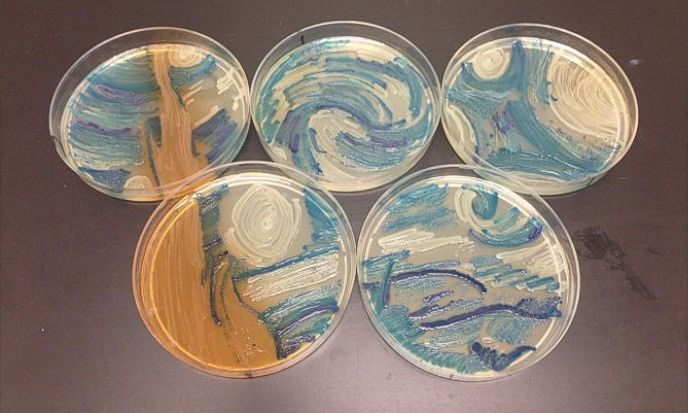
The microscopic masterpieces included a recreation of Vincent van Gogh's "The Starry Night" by Missouri microbiologist Melanie Sullivan. She used several types of bacteria to produce the various colors, including bacteria that is "a common cause of lower urinary tract infections" and a bacterium that can cause infections including pneumonia and meningitis, according to her description of her piece.
这些用显微镜才能观察的作品中,来自密苏里州的微生物学家梅勒妮•沙利文(Melanie Sullivan)的作品复刻了梵高的《星空》。她的作品描述介绍称,她用多种类型的细菌制作出多种颜色,包括“引起下尿路感染的常见病原菌”和一种可导致肺炎和脑膜炎的细菌。
"Because a lot of these bacteria can have dangerous implications, we made sure all the submissions had to come from a member of the society," ASM marketing coordinator Chaseedaw Giles told ABC News. "Lots of safety precautions have to be taken, especially in properly storing and disposing these cultures, so we didn't just want random people playing around with bacteria."
ASM市场部协调员查西道·贾尔斯(Chaseedaw Giles)告诉美国广播公司新闻(ABC News):“因为这些细菌中有很多具有危险性,所以我们确保所有参赛作品都是来自协会成员。我们做了很多安全防范措施,尤其在这些培养菌的妥善保存和处理方面,所以我们可不是让随便某个人来摆弄细菌。”
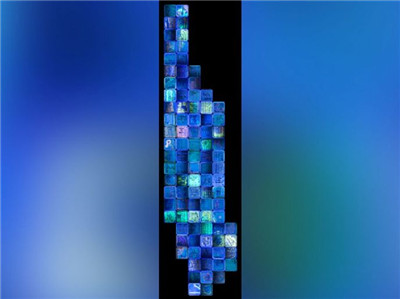
The "Agar Art" contest ran through this summer, and the winners were announced in late September after a panel of five judges - including professors and an artist - reviewed the submissions based on "creativity, design, and presentation," Giles said.
贾尔斯介绍,“琼脂艺术”大赛持续了一个夏天,最后由包括微生物学教授和一名艺术家在内的五名评委经过认真的审查,作品的“创造性、设计和展示”于9月份评选出最后的获胜者。
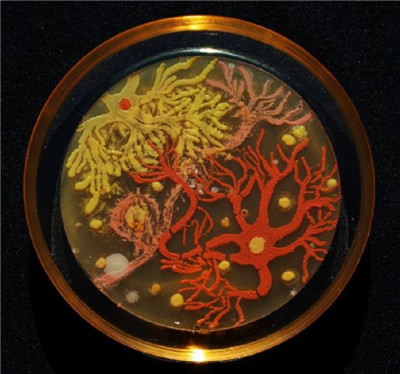
The top three winners included artistic renditions of neurons, a map of New York City and the harvest season.
前三名作品分别是神经元的艺术再现、纽约市地图和收获的季节。
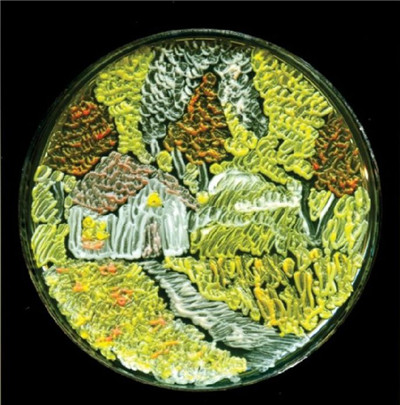
"One of the coolest things about the contest has been reading the descriptions from the scientists of all the ways they grew these different bacteria and all the trial-and-error they had to do," Giles said. "Many talked about the number of tries it took them to get certain patterns and intensity of color. Everyone did something different to come up with their final product."
贾尔斯说:“这次比赛最酷的地方之一就是阅读各位科学家关于如何培养这些不同的细菌以及他们反复试验的过程描述。很多人描述了自己为了得到特定的图案和色彩饱和度反复尝试了多少次。每个人都为了最后的作品尝试了很多不同的事情。”
The contest has also dispelled a long-held stereotype that scientists can't be artistic and vice versa.
本次比赛也打破了一直以来人们觉得科学家不懂艺术,艺术家不懂科学的成见。
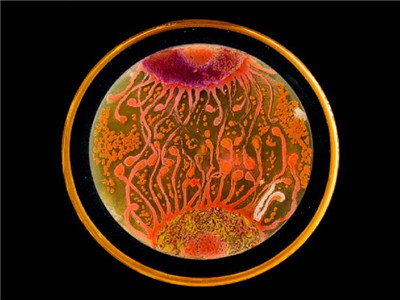
"I think this is a great example of the beautiful things that can come out of not putting people in certain boxes and defining them by a strict label," Giles said. "It shows art and science can be married together."
贾尔斯说:“跳出原有的框架和避免严格的标签定义能够产生美好的事物,我觉得这次比赛就是一个很好的例子。它展现了艺术和科学可以很好的融合在一起。”


